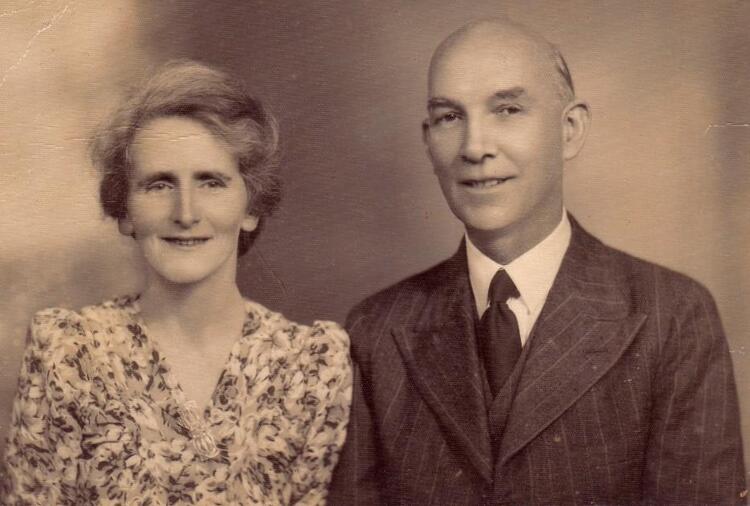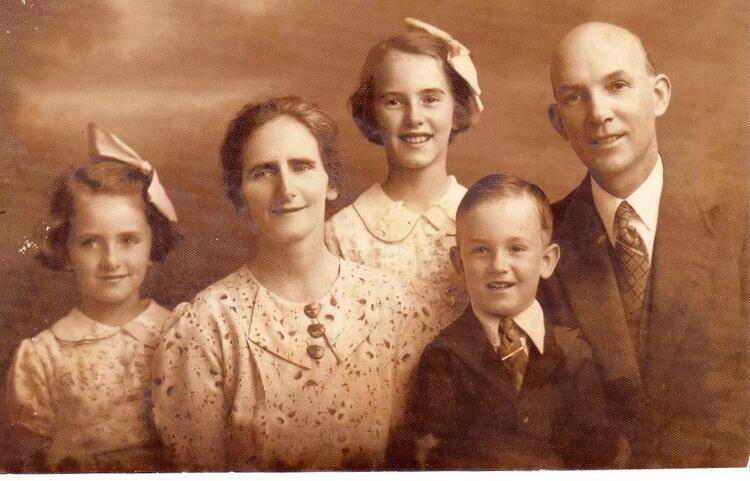Wilfred George Crofts was born in London on April 11th, 1896, the tenth child of non-conformist Alice Mary Bray and Roman Catholic Nicholas Joseph Crofts. In the beginning, there was no direct connection to missionary service; yet early he had desires of this kind, his memories including feelings of commitment to Christ. Though he had done well, he dropped out of school on his 14th birthday and obtained a reporter’s position at a local newspaper.
Because of the eldest sister, Nellie’s tuberculosis, the doctor advised that they should move to a warmer climate and after discussions and enquiries, migrated to Western Australia, arriving at Fremantle on 20th February 1911. In Perth, he attended night school and obtained a position as an office boy with a leading legal firm. From the time of their arrival in Perth, they attended the city Baptist Church. He entered into the life of the church much more fully and his Christian understanding deepened through the preaching of Rev. F.E Harry.
At the outbreak of the 1st World War on 4th, August, 1914, Wilfred enlisted in the armed forces and along with several of his church friends, departed overseas. He was wounded in the leg in August 1918 and came home on crutches after hospitalization in England. He returned to the legal office and after matriculation, began night classes at the University of Western Australia. He studied for the ministry at the Baptist Theological College in Melbourne, completing his BA at Melbourne University at the same time. In March 1921, he applied to the Foreign Mission Board of Australian Baptists to work as a missionary and at the close of 1923 headed off to East Bengal, which at that time was the only mission field served by the Australian Baptists.
Gwenyth Crofts
Gwenyth Isobel Harry was the first child of Helen and Frederick Edward Harry and was born on 30th June, 1897, in Sydney. She had four sisters and a brother. The family moved to Perth in Western Australia in August 1913, where F.E Harry became the pastor of the city Baptist Church. Sunday was based at the church; the whole family being involved. She took active part in the church choir, accompanying and conducting the Sunday School and Junior Choir She was vested with many gifts and a cleaver brain. She was a very bright student and graduated with first class honors in 1918 from the University of Western Australia. The Alliance Francaise Gold Medal constituted the first demonstration of her outstanding linguistic ability. She taught for some time but in late 1918, submitted an application to the Foreign Mission Board of Australian Baptists. No formal training for missionary work was required, her family life and experience in manse and church being taken as sufficient. On November 23rd, 1920, she set out by ship for Mymensing in East Bengal, farewell by her family and friends. On board the ship also were William Carey, the great grandson of the famous missionary, and his wife.
Wilf a Gwenyth toured widely and energies concentrated on revitalizing the school and church and making contact with the scattered groups of Baptists long without support. Dormant Christianity was rekindled, the faithful invigorated, education enhanced and the building of community commenced. They also travelled outside Tukrajhar and while touring the district, they met a young man and asked him if he was a Garo. This casual meeting led to the development of ABMS work among the Garo at Bagpara.
In May 1951, Wilf and Gwenyth moved from Tukrajhar to Bagpara village. Having spent many years among the Garo of the Birisiri area, they had no difficulty living among them. Tensions following the establishment of East Pakistan brought some Garos as refugees from the Birisiri field and happy relationships were renewed. Here too, they laid the foundation of a strong independent Garo Church.
Gwenyth in late 1951 and Wilf in mid-1952 were farewelled with immense appreciation and affection by the various groups of people with whom they had worked in Goalpara. Rev. Peter Ewing, who took over as the missionary at Tukrajhar after Rev. Crofts, paid them this rich tribute for their untiring service.
“It is seldom given to any one missionary to win the special affection and regard of the community in more than one place during his career, but in both the Garo and Boro fields, Wilf Crofts has a special in the hearts of the people. Among both Garos and Boros, his greatest contribution has been this— not only has he deepened and vitalized their faith in the Master and their understanding of the Kingdom, but he has awakened their own ability to serve Him and extend His Kingdom. No longer do they see themselves as isolated groups of Christians almost insignificant in this country of teeming millions—they have become a Church, an organic living body, a hand stretched out to their own people, and to others. It has not been easy to this. It is often most difficult to keep oneself from rushing in with what seems like urgently needed help, to wait till community itself feels the need and responds and meet the need in its own way. That requires statesmanship rather than mere leadership but it is the only way in which a truly independent and Christ centred Church can be established.”
Wilf and Gwenyth Crofts joyfully settled into family life in Perth on retiring from the mission. But even than he had a busy programmed of visits to Baptist churches around Australia bringing vividly before people something of the lives and importance of those to whom love and service had been so unstintingly given in India. Mrs. Crofts was called to be with her Lord in 1960 and on May 8th, 1971, Wilf followed her to be with their Master and Lord together always.
(All the above material is extracts taken from the paper presented to the “Baptist Historical Society of Western Australia” by Joy Devereux (daughter of Rev Wilfred and Gwenyth Crofts) and the book “Assam Not By Chance” by Dr. J. V. Webster and D.N. Cheney, former missionaries to Tukrajhar and Bagpara.)
Dr. Pradip Narzari (MBBS, FCAMS)
Tukrajhar

